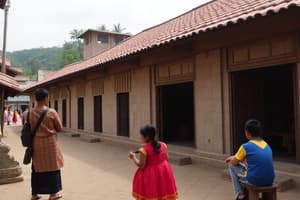Podcast
Questions and Answers
What is primarily encompassed within the subject of Araling Panlipunan?
What is primarily encompassed within the subject of Araling Panlipunan?
- History, Geography, Civics, Economics (correct)
- Civics, Culture, Geography, Literature
- Mathematics, Science, Philosophy, Literature
- Art, Music, Physical Education, Computing
Which component addresses the understanding of natural resources and environmental issues?
Which component addresses the understanding of natural resources and environmental issues?
- Culture
- Geography (correct)
- Economics
- History
Which of the following is NOT a goal of Araling Panlipunan?
Which of the following is NOT a goal of Araling Panlipunan?
- Encourage active citizenship and civic responsibility
- Enhance mathematical problem-solving skills (correct)
- Promote critical thinking about social issues
- Develop understanding of Filipino identity
What teaching strategy involves visits to enhance learning?
What teaching strategy involves visits to enhance learning?
Which assessment method aims to evaluate knowledge retention?
Which assessment method aims to evaluate knowledge retention?
Which of the following describes a current trend in Araling Panlipunan education?
Which of the following describes a current trend in Araling Panlipunan education?
What is a challenge faced in teaching Araling Panlipunan?
What is a challenge faced in teaching Araling Panlipunan?
What aspect of Araling Panlipunan encourages research and presentation?
What aspect of Araling Panlipunan encourages research and presentation?
Study Notes
Araling Panlipunan Overview
- Definition: Araling Panlipunan is a subject in the Philippine education system focused on social studies, encompassing history, geography, economics, civics, and culture.
- Goals:
- Develop understanding of Filipino identity and culture.
- Promote critical thinking about social issues.
- Encourage active citizenship and civic responsibility.
Key Components
-
History:
- Study of significant events in Philippine history.
- Understanding the influence of colonization, revolution, and independence.
- Exploration of key historical figures and their contributions.
-
Geography:
- Physical and political features of the Philippines.
- Understanding natural resources and environmental issues.
- Study of regional cultures and their geographical contexts.
-
Economics:
- Basic economic concepts: supply and demand, production, and consumption.
- Analysis of the Philippine economy, including agriculture, industry, and services.
- Discussion of global economic relationships and trade.
-
Civics:
- Principles of governance and political systems.
- Rights and responsibilities of citizens.
- Importance of participation in democratic processes.
-
Culture:
- Exploration of Filipino traditions, languages, and arts.
- Study of cultural diversity within the Philippines.
- Examination of contemporary social issues and their cultural implications.
Teaching Strategies
- Interactive Learning: Use of group discussions, role-playing, and simulations.
- Field Trips: Visits to historical sites and museums to enhance learning.
- Project-Based Learning: Assignments that encourage research and presentation on relevant topics.
Assessment Methods
- Quizzes and Exams: Evaluate knowledge retention and understanding.
- Essays and Research Papers: Assess critical thinking and analytical skills.
- Group Projects: Foster collaboration and practical application of concepts.
Current Trends
- Integration of technology in teaching (e.g., online resources, educational apps).
- Emphasis on global citizenship and awareness of international issues.
- Focus on environmental education and sustainability in social studies.
Challenges
- Addressing diverse learning needs and styles.
- Ensuring relevance of content to contemporary issues.
- Balancing traditional curriculum with innovative teaching methods.
Overview of Araling Panlipunan
- Araling Panlipunan is a crucial subject in the Philippine educational system, concentrating on social studies, including history, geography, economics, civics, and culture.
- Aims to foster a strong understanding of Filipino identity and culture, promote critical thinking regarding social issues, and encourage responsible citizenship.
Key Components
-
History:
- Examines significant events in Philippine history and their implications.
- Highlights the effects of colonization, revolutions, and the journey to independence.
- Studies impactful historical figures and their roles in shaping the nation.
-
Geography:
- Covers both the physical and political characteristics of the Philippines.
- Investigates natural resources and pressing environmental challenges.
- Analyzes regional cultures in relation to geographical contexts.
-
Economics:
- Introduces fundamental economic principles like supply and demand.
- Evaluates the structure of the Philippine economy, including primary sectors such as agriculture and industry.
- Addresses the country's trade relationships in a global context.
-
Civics:
- Explains governance principles and various political systems in the Philippines.
- Identifies the rights and responsibilities of citizens.
- Emphasizes the necessity of participation in democratic processes.
-
Culture:
- Explores Filipino traditions, languages, and artistic expressions.
- Studies the country's cultural diversity and its significance.
- Examines social issues and their cultural repercussions in contemporary society.
Teaching Strategies
- Interactive Learning: Incorporates activities like group discussions, role-playing, and simulations to engage students actively.
- Field Trips: Provides real-world experiences through visits to historical sites and museums, enhancing educational engagement.
- Project-Based Learning: Assigns research and presentation tasks that contextualize relevant social themes for students.
Assessment Methods
- Quizzes and Exams: Used to gauge retention of knowledge and comprehension of topics.
- Essays and Research Papers: Measure students' abilities in critical thinking and analytical writing.
- Group Projects: Encourage teamwork and practical application of theoretical concepts learned.
Current Trends
- Growing use of technology in education, including online resources and educational applications.
- Increasing emphasis on global citizenship and awareness of international concerns affecting society.
- Focus on environmental education and sustainability, integrating these themes into social studies curricula.
Challenges
- Need to address varied learning needs and styles among students for effective teaching.
- Importance of keeping the curriculum relevant by connecting it to contemporary social issues.
- Balancing traditional academic content with modern, innovative teaching methodologies to engage students effectively.
Studying That Suits You
Use AI to generate personalized quizzes and flashcards to suit your learning preferences.
Description
This quiz covers the essential components of Araling Panlipunan, a subject in the Philippine education system focused on social studies. You will explore key areas such as history, geography, and economics, enhancing your understanding of Filipino identity and culture. Test your knowledge on significant historical events, geographic features, and basic economic concepts.




